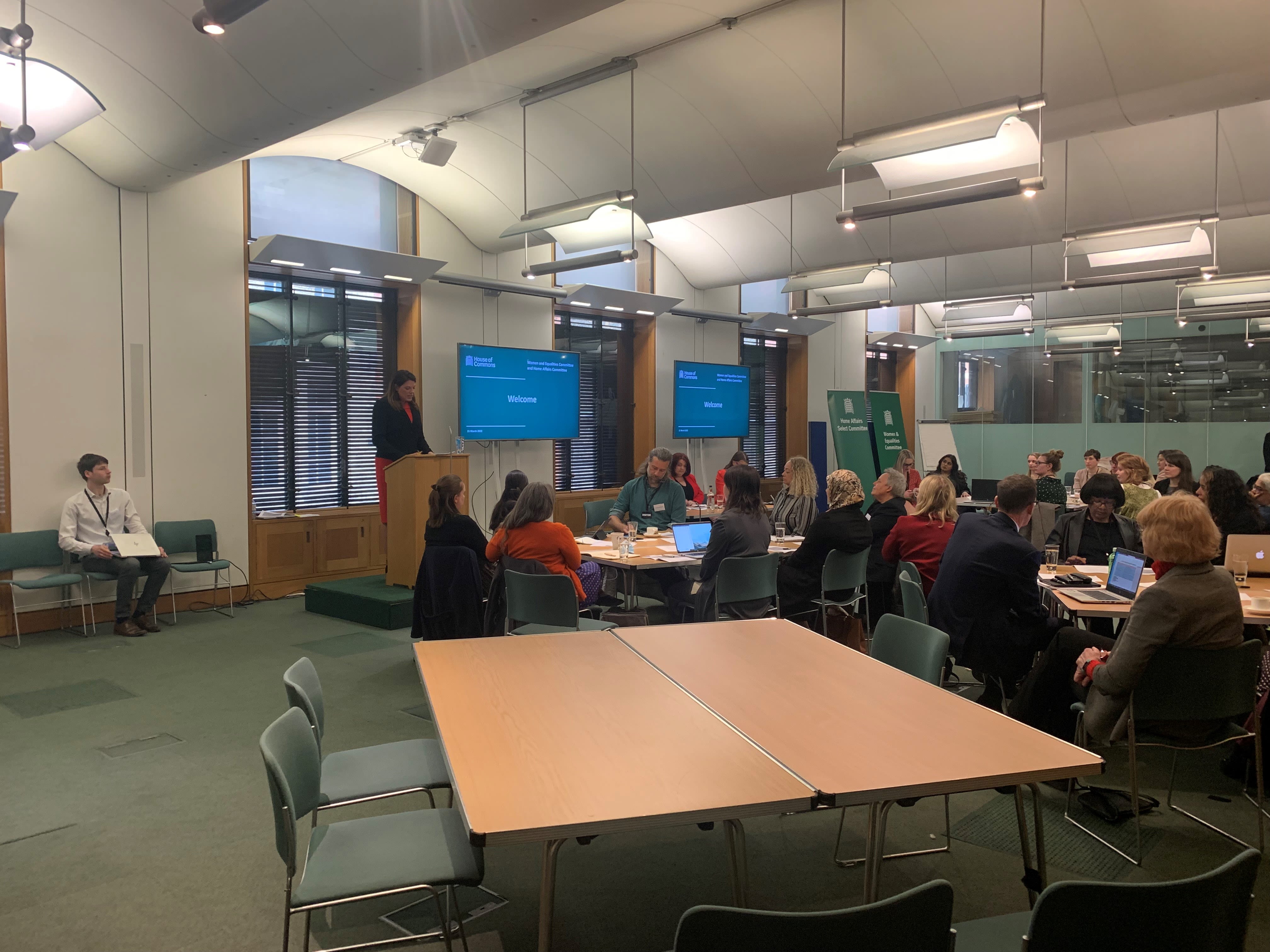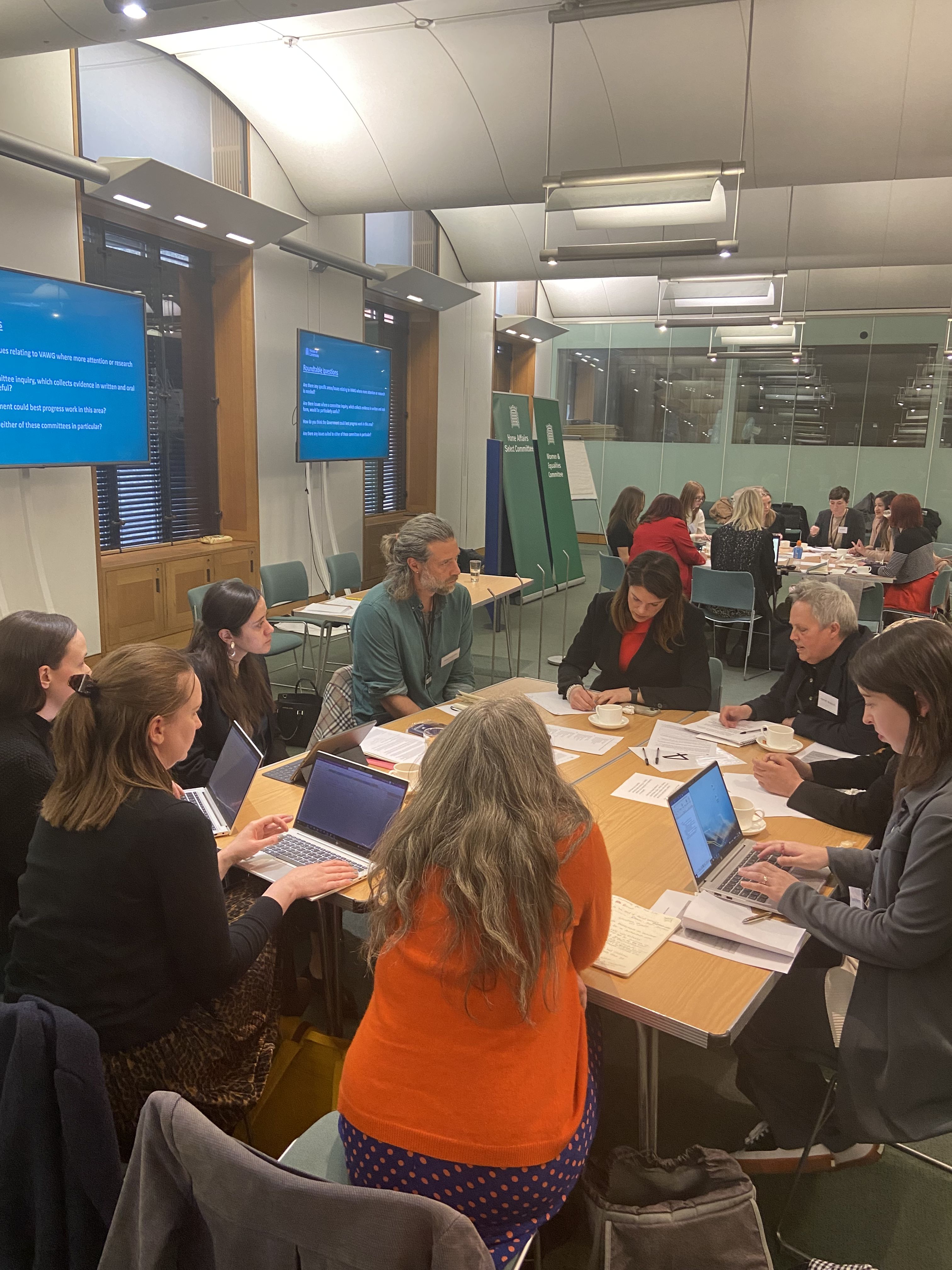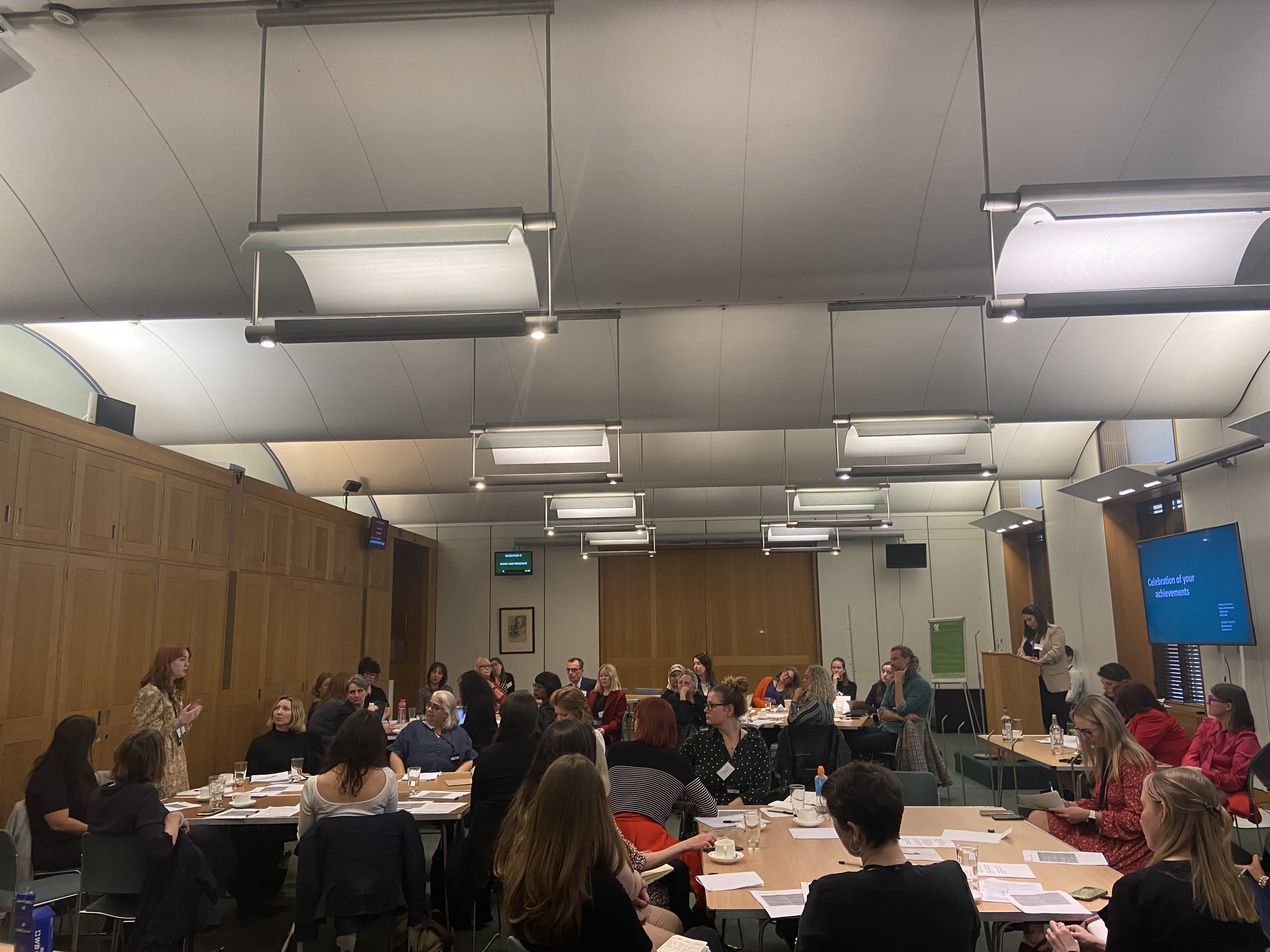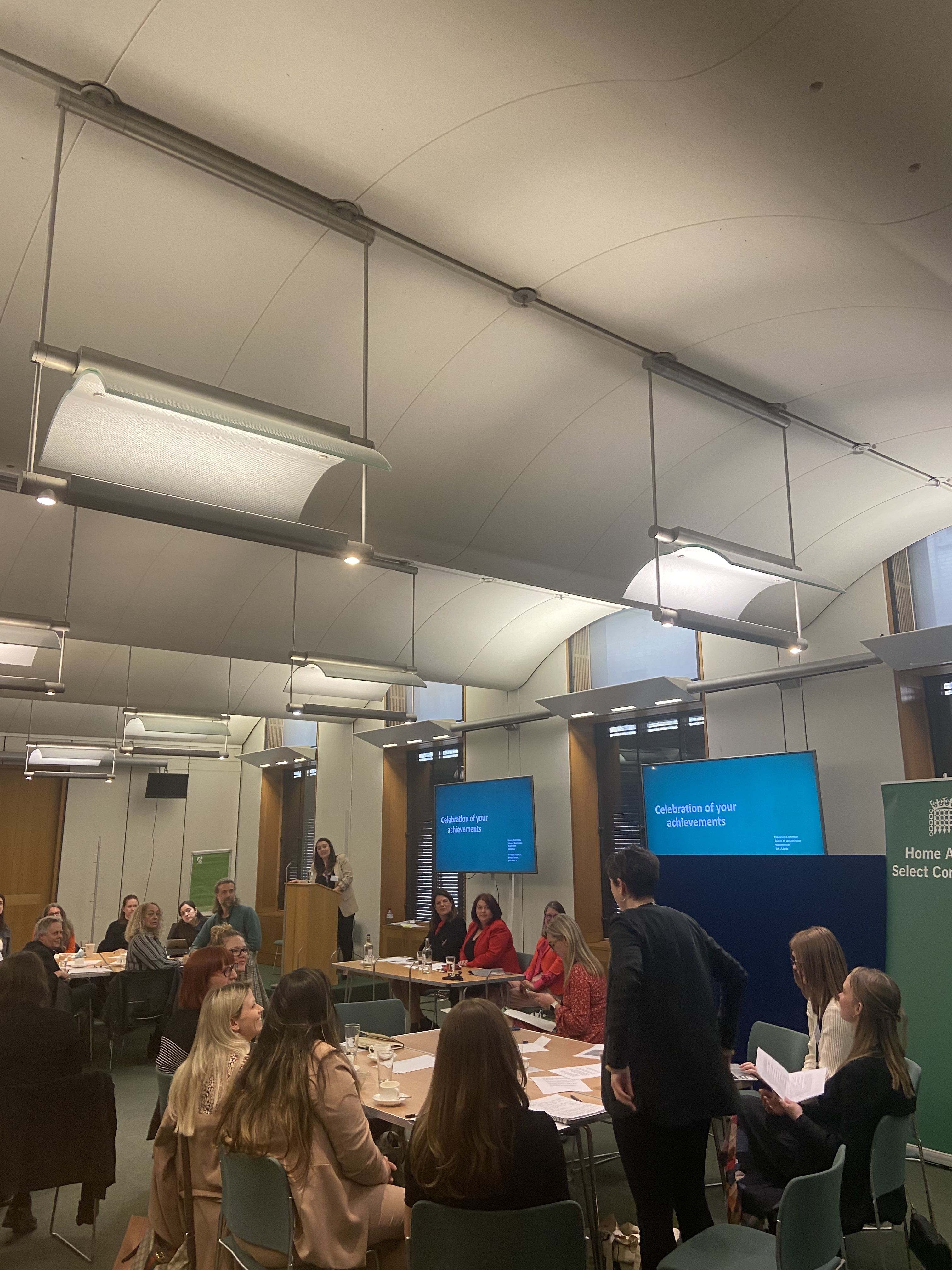Preventing Violence Against Women and Girls Event

On Monday 21 March, the Women and Equalities Committee and Home Affairs Committee co-hosted a Prevention of Violence Against Women and Girls round-table event.
This was an opportunity for both Committees to meet some of the key stakeholders working across the Violence Against Women and Girls (VAWG) sector and to discuss some of the key challenges and issues.
The event aimed to recognise and celebrate some of the key achievements stakeholders have made in this area, as well as consider some of the further work that needs to be done to address violence against women and girls.

Survey
To help shape discussions at the event, on International Women’s Day, the Women and Equalities Committee published a short questionnaire asking the public for their views on what areas the Committee should focus its VAWG work on.
The results of the questionnaire helped inform discussions at the event. Over 17,000 people responded to the three-day survey indicating respondents wanted the committee to first focus on:
- Attitudes towards women and girls in educational settings
- Pornography
- How to prevent perpetrators from committing increasingly serious crimes

What has been achieved?
There is significant work that still needs to be done to tackle violence against women and girls.
However we must congratulate the hard work stakeholders have already done in this area and what they have achieved over the last few years.
Organisations have faced particular challenges over the COVID-19 pandemic and we felt it was important to reflect on those challenges. We therefore invited stakeholders to tell us about their achievements.
Some of the organisations at the event summarised their work and you can read this below.
What have these stakeholders been working on?
Southall Black sisters
Southall Black Sisters, like others, have had a difficult two years with the pandemic. We saw a surge in domestic abuse cases with increased hardship for black and minority women. In particular, migrant women with no recourse to public funds (NRPF) had even fewer avenues to safe accommodation as agencies were closed or reduced their services. Even refuges which normally assist those with NRPF were oversubscribed. Fortunately, funders, both government and non-government, responded well to the crisis with emergency funding and flexibility to vary our budgets. We set up a special hostel project with Solace Women’s Aid with funding from MOPAC, which increased access to safe accommodation for all women, including those with NRPF.
In terms of other positives, we welcome the Home Office pilot scheme for those with NRPF, which we have been leading in a partnership project. However, we remain concerned about longer-term plans. We call for a reform in the law so that the Destitution Domestic Violence Concession (DDVC) is extended to victims on non-spousal visas; and for the DDVC to be available for six months. We are also concerned that the Home Office has not agreed to implement a firewall on data sharing between the police and Immigration Enforcement following our successful super-complaint. We continue to campaign with LAWRS and Step Up Migrant Women campaign to establish a firewall so that all victims can obtain protection from abuse without the fear of deportation.
Womens' Aid
Women’s Aid’s 170 member services across the country deliver life-saving work every day to women and children, and in 2020-21 – during the pandemic – supported a staggering 11,000 women and 12,000 children in refuge and 125,000 women and 150,000 children in community based services.
During the pandemic the federation also launched two initiatives to support survivors, including our Rail to Refuge scheme which helps on average 4 survivors, including children, find safety each day and our Live Chat Helpline which provides a vital lifeline to survivors: “Live Chat meant I could chat on my phone quietly rather than being on the phone which is exactly what I needed.”
Finally in recognition of the impact of the pandemic, but also the well-evidenced life-long impact that domestic abuse has on the mental health of women and their children, we launched a new flagship campaign, Deserve To Be Heard, which aims to ensure that the mental health needs of women, who are all too often not listened to and not believed, are heard and responded to effectively.
Safe Lives
- Establishing ‘Safe Young Lives’, a programme of work focused on the primary prevention of domestic abuse
- Helping change the conversation of the public and policy makers from ‘Why doesn’t she just leave?’ to ‘Why doesn’t he stop?’ Our Drive programme with high risk perpetrators of domestic abuse has now had a positive impact for 10,000 adult and child victims of abuse, working with nearly 4,000 perpetrators
- Continuing to prioritise work which surfaces and amplifies the voice of individual survivors of abuse, so they speak in their own voice about what change they want to see
- Developing the ‘Reach In’ campaign, during Covid, which helps individual citizens to recognise signs of abuse and act safely on their instincts to help a friend, neighbour or colleague
- Supporting frontline organisations during Covid to get the policy, funding, awareness and wellbeing support needed to keep going during the pandemic.



Latin American Women's Rights Service
We are proud of having our frontline service open from the first lockdown and providing support to some of the most vulnerable groups of victims/survivors of VAWG, thanks to the team's commitment. In the last years, we have developed our policy and campaigning work on gender-based violence, raising awareness of the multiple and overlapping barriers that migrant women encounter in their pathway to safety.
One of the main achievements is to ensure key stakeholders and decision-makers hear migrant victims'/survivors' voices. In this vein, our advocacy work with the Step Up Migrant Women campaign in light of the progress of the Domestic Abuse Act, despite the rejection of the migrant women amendments, is an excellent example of our success. In the policy area, we have published a new guide for police and labour inspectorates on better supporting victims of crime (including victims of domestic abuse and other forms of VAWG) with insecure immigration status.
However, when reflecting on our accomplishments, we cannot ignore the human cost of the last two years to the VAWG sector with high levels of burnout and colleagues leaving the sector.
Solace Women's Aid
1. Rising to the challenge of the pandemic, which saw an increase in demand for our services at the same time as our staff changed the way they worked, working from home and responding to women by email and text because survivors living with perpetrators didn’t have safe spaces to call from, and providing more regular emotional support to survivors, many of whose mental health needs increased. We had to turn away two referrals out of seven from our counselling services in December 2020 because of lack of capacity. We were able to accommodate just 40% of referrals to our refuge services in December 2020, turning one third away due to lack of capacity (rather than suitability). We saw demand for our services fluctuate with the tightening and easing of restrictions and demand has now stabilised at a higher level than pre-pandemic. July 2021 was the busiest month on our advice service since the beginning of the pandemic, with a 67% increase in demand in July 2021 compared with July 2020.
2. During the pandemic, in partnership with Southall Black Sisters, Solace opened an emergency crisis hostel providing wraparound care including meals, with SBS providing expert support for migrant women and those with no recourse to public funds. The hostel filled up within two weeks, faster than anticipated, and provided a model that was more suitable for single women and women with insecure immigration status, some of whom moved into refuges after staying for a short period in hostel because they had been able to regularise their status or find a funded place. Other women, with support, moved into self-contained accommodation or temporary accommodation provided by local authorities. Having proven this model was needed and had good outcomes, we were pleased the Department for Levelling Up, Housing and Communities included it in the statutory guidance for safe accommodation.
3. The growth of our services that work with women who have experienced multiple forms of disadvantage which can include significant mental health and/or problematic substance use, exiting prostitution, potential involvement in the Criminal Justice system and/or No Recourse to Public Funds has improved outcomes for this marginalised group of women and survivors of VAWG. In 202/21 we worked with 60 survivors in our multiple disadvantage services, which include an assertive outreach programme, a Housing First scheme for women, and a multiple needs refuge, most of which are run in partnership with other specialist and ‘by and for’ VAWG services. With our intensive and trauma-informed approach, many of these women have re-engaged with services and stabilised their lives. In March this year, the Women’s Development Unit – a partnership between Solace and Connection at St Martin, published a strategy to end women’s homelessness in the capital, based on a year of research and evidence building working with stakeholders and women with lived experience.
Fawcett Society
Fawcett is a membership charity campaigning for gender equality and women’s rights at work, at home and in public life. In relation to preventing violence against women and girls, we’ve been working to tackle gender stereotypes, eliminate workplace sexual harassment and make misogyny a hate crime.
To build consensus on the impact gender stereotypes have and what can be done to end them Fawcett brought together an expert Commission on Gender Stereotypes in Early Childhood. Their final report Unlimited Potential, published in 2021, highlighted how society teaches children life-limiting stereotypes from the moment they are born. As a result of our engagement with Ofsted on this issue they’ve moved tackling gender stereotypes from the ‘outstanding’ to ‘good’ level of their inspection framework, meaning the requirement covers a greater proportion of schools. The Department for Education also amended the early years curriculum guidance to factor in gender stereotypes insight from our research. We’ve also worked with LIONS to develop new guidelines on challenging stereotypes in advertising.
Our 2021 report Tackling Sexual Harassment in the Workplace highlighted how pervasive workplace sexual harassment is. In July 2021, the UK Government committed to legislation for a duty on employers to prevent sexual harassment, following campaigning by Fawcett and other groups. In 2022, we launched a Workplace Toolkit to support employers to create the changes required in their workplaces to prevent sexual harassment.
Following our 2018 Sex Discrimination Law Review, Fawcett has been campaigning for misogyny to be included within the hate crime framework. Many more actions need to be taken to address the multiple forms of misogyny which are prevalent in our society, but we believe there is space within the hate crime framework to include hostility towards women, and that this will be a valuable additional tool in recognising and responding to women’s experiences of harassment and violence.



NIA
Nia’s staff team supported over 1,500 women and girls each year over the last two years, which as others have pointed out, included the pandemic. Our community-based services switched to mainly home-based working, enabled by our creative and responsive central services and senior management team (and additional emergency funding, thank you) and our two specialist refuges for women with problematic substance use and/or who have been subjected to sexual exploitation, particularly prostitution, stayed open throughout. But I’d like to focus on our strategic input, the difference that a small, proudly feminist service provider can make:
1. Through the Femicide Census and Counting Dead Women: Raising awareness of the scale and connected nature of different forms of femicide, men’s fatal violence against women; pushing the understanding that men’s violence against women is a societal issue, situated in patriarchy, not simply one of individual men’s pathology and just a matter of poor policing and ineffective criminal justice systems/procedures, though they are of course important, perfect policing and criminal justice will not stop men from killing women; and doing the ground work so that Jess Phillips MP can annually read out, in parliament, the names of all women killed by men, ensuring that their names are recorded in Hansard in perpetuity.
2. Nia was the first UK funded specialist organisation supporting victims of men’s violence to have the integrity and courage to raise our voices about the critical importance of single-sex services for women victim-survivors of sexual and domestic violence and abuse, including prostitution. We developed a ‘Prioritising Women Policy’ based on utilising the Single Sex Exemptions permissible within the Equality Act. We gave written and verbal evidence to the Women and Equalities Select Committee when other women’s organisations who shared our position were afraid to speak publicly. We made it clear that services which include trans identified males are mixed sex, not women-only services, and that where this is based on shared spaces, it is absolutely not in women’s best interests and it is not trauma informed.
Beyond Equality
The highlights for Beyond Equality:
- The shifting of the conversation to the need to engage men and boys in addressing systemic problem of male violence against women, has led to a huge increase in demand for our work from individual men, with 1154 people turning up to our public trainings and 172 applicants for our facilitator training course.
- We have redesigned in person and online group workshop series, for workplaces, schools, community groups and universities.
- We will reach over 6000 young people with our work this year. Our schools project has been particularly impactful, delivering a three workshop series, delivering over 700 workshop sessions, each of 2hrs for an average of 18 students exploring masculinities. Our term 1 evaluation report stated that 100% of pupils say ‘the workshop helped them to understand gender based violence and what we can do about it.’ We have also trained 205 teachers in our approach.
End Violence against Women
The achievement of the End Violence Against Women coalition (EVAW) has been rising to the challenge of responding to and shaping the prevailing agenda around violence against women and girls (VAWG) across so many areas over the past year, and amplifying the work of our members.
We are a small organisation, with a growing membership of over 120 organisations, with work ranging from ensuring that the prevention of VAWG be prioritised by Government, to scrutinising the roll-out of RSHE in schools, pushing for the ratification of the Istanbul Convention through legislation, to challenging the criminal justice response to victims and survivors of rape and sexual violence (most notably in our strategic litigation against the Crown Prosecution Service).
In carrying out this work in challenging circumstances, we have remained committed to our principles in highlighting that VAWG is a cause and consequence of gender inequality, connected to other forms of discrimination and must be addressed within an intersectional human rights framework. Working to end VAWG in the current political environment is difficult.
Whilst on the one hand, we welcome the Government’s repeated assurance that tackling VAWG is a top priority, we are also faced with an array of policies and legislation which undermine this commitment (see the Policing and Nationality and Borders Bills, or proposals to overhaul the Human Rights Act). We are proud of the work of EVAW and our members in rising to this challenge.



Centre for Women’s Justice
Centre for Women’s Justice was formed in 2016 and since then has developed and expanded to play a unique role within the specialist women’s VAWG sector by:
- providing training to frontline services in laws and duties of police and other criminal justice agencies to enable them to more effectively advocate for their service users and challenge failings and malpractice
- by advising on laws and providing access to lawyers and legal remedies for service users
- by collating evidence, identifying and bringing strategic litigation challenges and police super-complaints to challenge systemic failings in criminal justice practices
- by providing an authoritative voice on issues around the law, human rights and legal cases to the media and politicians and others
Housing for Women
After the tragedy at Grenfell Tower, the housing community was on greater notice to ensure that all building safety protocols were in place and up-to-date. Working with old and new buildings brings its own set of difficulties, such as damp, installation, plumbing. As we fix issues, to ensure residents are safe, we’ve been trying to find solutions that mitigate any risks. This can be difficult but we have been working tirelessly to ensure our properties are safe for the women we house.
As with the rest of the world, COVID-19 and Lockdown restrictions brought a lot of challenges to Housing for Women, and the way we implemented our work. We have Refuges within 2 London boroughs. These schemes operate with a level of care, to ensure survivors can get all the help they need to rebuild their lives. Which meant that staff had to find ways of keeping this lifeline intact. As well as monitoring the building to ensure it was safe & secure.
At first we noticed a dramatic impact on mental health, as the women & children felt isolated. However, the staff rallied, and HfW provided COVID grants, which allowed them to purchase laptops and tablets. With these new resources, it meant staff were able to create ways of engagement that cut through the isolation.
‘SafeSpace’ is our service which helps women and children escaping the nightmare of human trafficking and is one of the only resources in London offering the support to help them get back on their feet. This service faced similar difficulties during lockdown, but it has also had to deal with funding pipelines drying up. HfW not only believes this service needs to continue, but that it also needs to expand and offer more help. We recently participated in ‘The Big Gives’ fundraising ‘Women & Girls Match Fund’ campaign, raising our target of £10,000. This means ‘The Big Give’ will match the amount, and we will be able to inject £20,000 into our support for women & children affected by trafficking.



At the event these organisations sat on tables with Members from both the Home Affairs and Women and Equalities Committees. Some of the key issues that were a priority for the stakeholders were:
- Perpetrators not being enough of a priority
- There not being enough support for children affected by domestic abuse
- Minoritised women not being prioritised because of gaps in legislation
- The need for more long-term funding for specialised services
- The Government’s VAWG strategy and the need for more a more intersectional approach
- An opportunity for VAWG to be addressed in the upcoming Online Safety Bill
- Lack of inquiry around coercion and consent
- Criminalisation of victims of abuse
What's next?
Women and Equalities Committee
As a result of this event, the Women and Equalities Committee will undertake a series of different work strands relating to Preventing Violence Against Women and Girls:
We have launched a short, two session inquiry into Pornography and its impact on violence against women. These sessions have been programmed to align with the progress of the Online Safety Bill, and explored the extent of pornography use in the UK amongst other issues.
We have launched an inquiry into Misogyny in Music in order to explore cultures and attitudes towards women in the music industry, and how these feed into societal attitudes generally.
We have set up a dedicated sub-committee to look at attitudes towards women and girls in educational settings.
These are the three strands we will focus on initially. We expect further work to be launched on VAWG at a later date.
Home Affairs Committee
The Home Affairs Committee, has recently published its reports into the Investigation and prosecution of rape and Spiking, and will be considering next steps for its Violence Against Women and Girls inquiry in the coming months.
We will seek to draw on the valuable discussions that were had at our event, as well as the joint Area of Research Interest, launched together with the Women and Equalities Committee.
You can keep up-to-date with the Home Affairs Committee’s work on Twitter (@CommonsHomeAffs).
We would like to thank all those organisations who came to our event on Preventing Violence Against Women and Girls.
